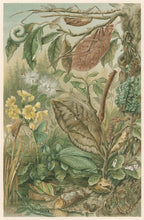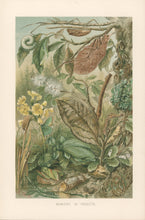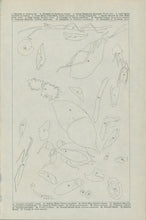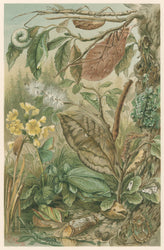H. Morin. “Mimicry in Insects.” From Richard Lydekker’s The New Natural History.
New York: Merril & Baker, ca. 1899. American edition. 5 1/4 x 8. Chromolithograph. With key to insects on onion skin paper.
This print is from the American edition of the Royal Natural History. These finely drawn illustrations of natural history are typical of the nineteenth century or romantic approach to showing wildlife. At a time when the animals were sometimes as new to man as the countries that were being explored, the depiction of active fauna in the natural habitat was important to art and science. A great number of illustrators contributed to this effort to provide an American contribution to the world of science. In the 1880s methods of printing in colors were greatly enhanced by development of circular presses with the ability to wrap a piece of chrome, tin or other metals around a drum. It replaced flatbed presses. This process enabled better registration as each color on a print was adhered by a separate pass through the press. Color printing was less expensive and faster than the old hand coloring processes, so a great increase in the number of prints made came into existence for the expanding public readership of the Industrial Revolution.







